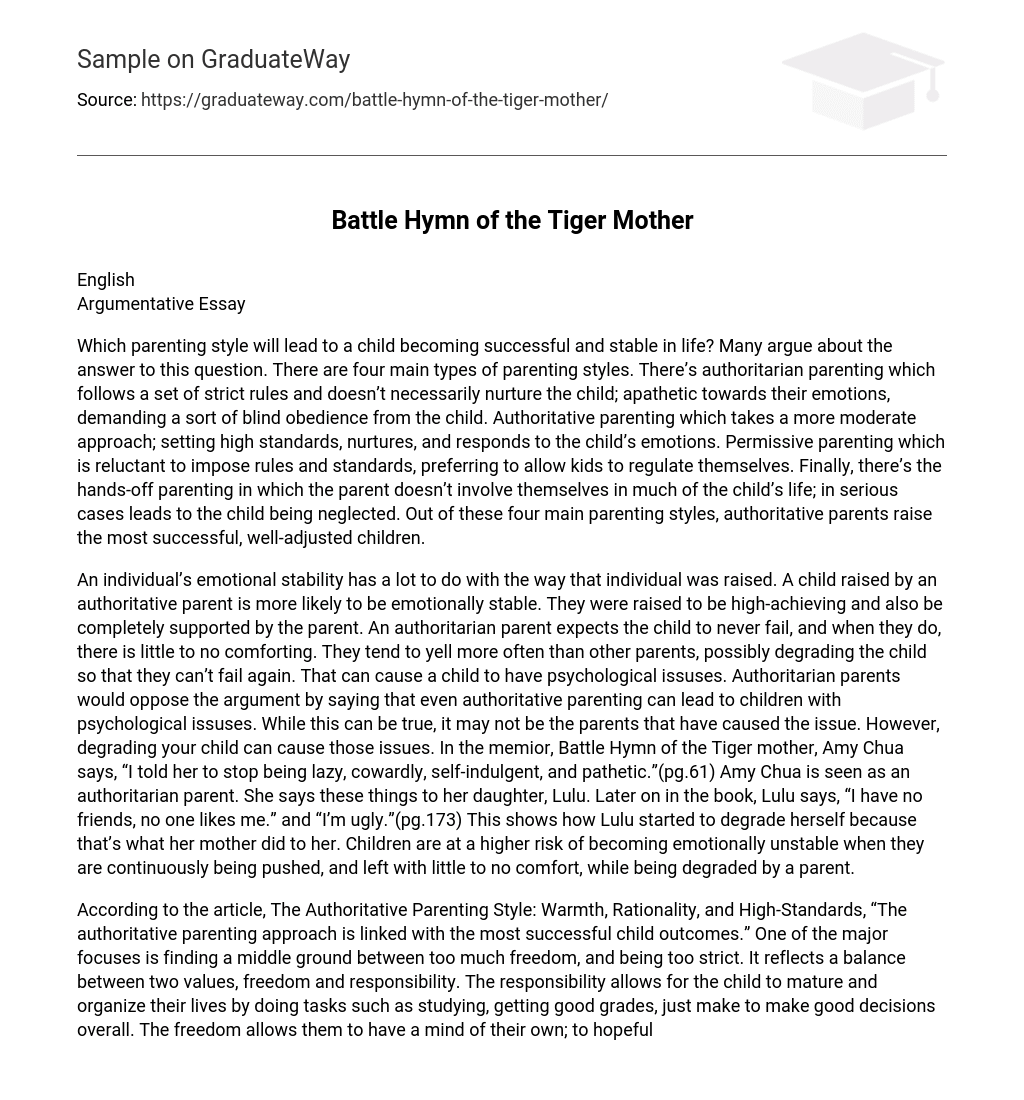English
Argumentative Essay
The topic of which parenting style will result in a successful and stable child is debated. There are four primary types of parenting styles. The first is authoritarian parenting, characterized by strict rules and a lack of emotional nurturing, demanding unquestioning obedience from the child. The second is authoritative parenting, which takes a more balanced approach, setting high standards while also nurturing and responding to the child’s emotions. The third is permissive parenting, hesitant to enforce rules and standards, preferring to let children self-regulate. Lastly, there is hands-off parenting where the parent has minimal involvement in the child’s life, potentially leading to neglect in severe cases. Among these styles, it is authoritative parents who raise the most successful and well-adjusted children.
The upbringing of an individual significantly affects their emotional stability. Having authoritative parents plays a crucial role in promoting emotional stability, as these individuals are taught to strive for success and receive consistent support from their parents. On the other hand, authoritarian parents have high expectations but offer little comfort when their children face failures. These parents often resort to yelling and potentially degrading their children, leading to potential psychological issues. It is important to note that opponents argue even authoritative parenting can result in children with psychological problems; however, it is the act of degrading the child rather than the parenting style itself that causes these problems. Amy Chua, an authoritarian parent, exemplifies this by criticizing her daughter Lulu in her memoir “Battle Hymn of the Tiger Mother,” stating: “I told her to stop being lazy, cowardly, self-indulgent, and pathetic” (pg. 61). Consequently, Lulu expresses feelings of social isolation and insecurity about her appearance (pg. 173), suggesting how she internalized her mother’s deprecation. Continuously pushing children without offering comfort while subjecting them to degradation puts them at a higher risk of developing emotional instability.
According to the article, The Authoritative Parenting Style: Warmth, Rationality, and High-Standards, it is stated that the authoritative parenting approach is associated with the most successful child outcomes. This approach focuses on finding a middle ground between excessive freedom and excessive strictness, striking a balance between freedom and responsibility. Responsibility allows children to mature and organize their lives by completing tasks like studying, achieving good grades, and making good decisions overall. On the other hand, freedom enables children to develop their own thoughts and learn how to make sound decisions in life, while also gaining experience of the real world. However, authoritarian parenting disregards this strategy, believing that granting freedom to children sets them up for failure. They prioritize maintaining high standards and strict rules to prevent any possibility of failure. Although I understand this perspective, I believe it is not an effective parenting approach. Without experiencing adversity or failure, children will struggle to navigate the real world. It is crucial for them to have freedom in order to learn how to cope with disappointment or failure when they encounter it on their own.
Based on The Fallacy of Tough Love, it is stated that authoritative parents will establish a stronger bond with their child. These parents are warm, encouraging, and supportive, while also setting clear conduct standards. This helps to foster a positive relationship where the child respects the parents and develops their own identity. In contrast, authoritarian parents believe in tough love as the preferred approach. According to the article, this parenting style relies on conditional love and responsiveness. However, both styles have the best interests of their children at heart. Nevertheless, it is ultimately the authoritative parents who will have a superior relationship with their child by combining standards with empathy and support to prepare them for success in reality.
The upbringing of a child greatly impacts their future. Emotional well-being, success, and the parent-child relationship all play a role in a child’s development. These elements are encompassed in an authoritative parenting style that includes support, nurturing, rule-setting, freedom allowance, and high standards. By being an authoritative parent, one can create a harmonious environment for the growth and maturation of their child.





